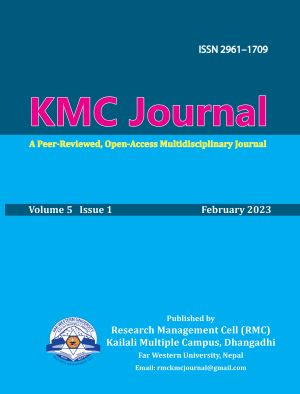The General Will of Rousseau in P.B. Shelley’s To a Sky-Lark
DOI:
https://doi.org/10.3126/kmcj.v5i1.52448Keywords:
Bliss, democratic spirit, freedom, natural state, personal will, will of allAbstract
This article explores Jean-Jacques Rousseau’s philosophical concept of “the general will” in P. B. Shelley’s poem “To a Sky-Lark”. The concept of “the general will” is a stage of uniting oneself with the will of all while enjoying personal will at the same time. It is the consensus of the will of all, and remains as the only way to be free from the narrow tutelage of this world. It is the perfect and ideal stage with the celebration of harmony. Similarly, the poem “To a Sky-Lark” unveils and expounds the intensity of the skylark as the source of happiness and bliss that spreads the fragrance of natural freedom. Its melody and song have the power to unite the whole human being at one point in the singularity of happiness by discarding personal will and desires. Likewise, the poem radiates the genial ideals of democracy, harmony, and solidarity. Shelley’s skylark and its melody weave the will of the whole humanity to liberate it from the constructed bondages and limitations. In this regard, the skylark becomes the emblem of “the general will” as projected by Rousseau. This study applies the paradigm of qualitative research and textual interpretation method with the theoretical lens of Rousseau’s “the general will” to explore its ideations in the poem.
Downloads
Downloads
Published
How to Cite
Issue
Section
License
Copyright (c) 2023 Sabindra Raj Bhandari

This work is licensed under a Creative Commons Attribution-NonCommercial 4.0 International License.
This license allows reusers to distribute, remix, adapt, and build upon the material in any medium or format for noncommercial purposes only, and only so long as attribution is given to the creator.




